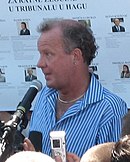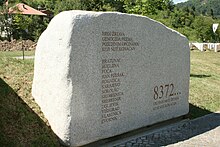Bosnian genocide denial
In its judgment, the ICJ adopted the ICTY's conclusion from Radislav Krstić's conviction and concluded what happened in and around Srebrenica was done by members of the Army of Republika Srpska (VRS) "with the specific intent to destroy in part the group of the Muslims of Bosnia and Herzegovina as such, which constitute acts of genocide committed".
Other international bodies, such as the European Court of Human Rights and the United Nations General Assembly, have also passed resolutions acknowledging genocide occurred in Bosnia.
During the Yugoslav Wars, Serb policies and their foremost protagonists have been whitewashed and justified by some "anti-war" and "anti-imperialist" public intellectuals and authors abroad, mostly on the left of the ideological spectrum, but also by "libertarian" right-wingers, and this has sometimes become outright denial.
[10][11] Besides the ICTY and the ICJ, other international bodies such as the European Court of Human Rights and the United Nations General Assembly also passed resolutions acknowledging genocide occurred in Bosnia.
They stripped all the male Muslim prisoners, military and civilian, elderly and young, of their personal belongings and identification, and deliberately and methodically killed them solely on the basis of their identity.
[32] From approximately 1 August 1995 to 1 November 1995, there was an organized effort on behalf of the military and political leadership of Republika Srpska to remove bodies from primary mass graves, and move them to secondary and tertiary sites.
[33] In the ICTY court case "Prosecutor v. Blagojević and Jokić", the trial chamber found this reburial effort was an attempt to conceal evidence of mass murder.
[34] The trial chamber found the cover-up operation was ordered by the Bosnian Serb Army (BSA) Main Staff, and was subsequently carried out by members of the Bratunac and Zvornik Brigades.
The removal and reburial of the bodies caused them to become dismembered, with parts of different individuals interspersed, making it difficult for forensic investigators to positively identify the remains.
[41][42] The report also makes allegations regarding examinations of the mass graves, saying they were made for hygiene reasons; it also questions the legitimacy of the missing-person lists, and undermines a key witness's mental health and military history.
[32] The ICTY described Republika Srpska's first report as "one of the worst examples of revisionism in relation to the mass executions of Bosnian Muslims committed in Srebrenica in July 1995".
[40][45] On 7 March 2003, the Human Rights Chamber for Bosnia and Herzegovina issued a decision that ordered Republika Srpska, among other things, to conduct a full investigation into events in Srebrenica in July 1995 and to disclose the results by 7 September 2003.
[39][56] The Office of the High Representative responded by saying; "The Republika Srpska government should reconsider its conclusions and align itself with the facts and legal requirements and act accordingly, rather than inflicting emotional distress on the survivors, torture history and denigrate the public image of the country".
The commission was initiated by Milorad Dodik and his Alliance of Independent Social Democrats party (SNSD), and the international community immediately criticised the action.
[60][61] Humanitarian Law Center's report described this new development as "the culmination of more than a decade of genocide denial and historical revisionism by the SNSD government in the Republika Srpska", adding the HLC regarded this initiative to be "illegitimate overall", and that it "represents a flawed response to a legitimate need".
[62] Serb policies in the Yugoslav Wars of the 1990s and its foremost protagonists have been whitewashed and justified by some "anti-war" and "anti-imperialist" intellectuals and authors outside Serbia, mostly on the left wing of the political spectrum, but also "libertarian", right-wing sources.
[67][63][66][68][69][70][excessive citations] Many revisionists mainly identified with the far-left of the ideological and political spectrum, such as Noam Chomsky, Michael Parenti, economist Edward S. Herman, David Peterson, Jared Israel, Tariq Ali, British journalist Mick Hume, Diana Johnstone, and John Robles of Voice of Russia, engaged in revisionism and denial of the Bosnian genocide and its aspects while blaming the West, NATO, Croats, Bosniaks, and Albanians for the Serbian's and their forces' actions, absolving the latter of any responsibility for the atrocities.
He added: "The Institute of Contemporary Arts, bulwark of progressive liberalism, enhanced LM's heroic profile by co-hosting a three-day conference with the magazine, called 'Free Speech Wars'.
[95] David Campbell, Visiting Professor in the Northern Centre of Photography at Sunderland University in the UK, said: The LM defendants and Thomas Deichmann were properly represented at the trial and were able to lay out all the details of their claim that the ITN reporters had "deliberately misrepresented" the situation at Trnopolje.
(That they didn't take up the opportunity to cross-examine the Bosnian doctor imprisoned at Trnopolje, who featured in the ITN stories and was called to testify on the conditions he and others suffered, was perhaps the moment any remaining shred of credibility for LM's allegations evaporated).
They were able to show the ITN reports to the court, including the rushes from which the final TV stories were edited, and conduct a forensic examination of the visuals they alleged were deceitful.
The Humanitarian Law Center criticised these attempts and described them as "the culmination of more than a decade of genocide denial and historical revisionism" by the party's government in Republika Srpska.
[114][115] In 2009, Lewis MacKenzie, former commander of the United Nations Protection Force (UNPROFOR) in Bosnia, in an article titled "The real story behind Srebrenica",[116] questioned the designation of genocide on the grounds the number of men and boys killed had been exaggerated by a factor of four.
Eyewitness Account of a Former UN Military Observer in Bosnia", and his memoir "A Guerra nos Balcãs, jihadismo, geopolítica e desinformação" (War in the Balkans, Jihadism, Geopolitics, and Disinformation) in November 2016.
[122] Austrian writer Peter Handke, who received the Nobel Prize in Literature in 2019, offered to testify on behalf of Slobodan Milošević at ICTY trials.
[125] Serbian-American politician and historian Srđa Trifković, criticised a video that was captured by the Scorpions, paramilitary units of the Serbian Ministry of Internal Affairs, who filmed themselves executing six Bosniak teenagers in woodland near Srebrenica.
[140] The decision not exclude the ICTY's final verdicts in the documentary was vehemently criticized, in particular by Mirsad Fazlic, the Bosnian reporter of Slobodna Bosna whom Flyum had interviewed for the film and had worked with for four years.
[141] In 2012, Russian lawyer and opposition politician Mark Feygin who served as a volunteer sniper in the Army of Republika Srpska gave an interview where he stated that the ethnic cleansing campaigns committed in Bosnia by Serbian forces were "mutual mass murders" and said that Ratko Mladić was not involved in the organization of the Srebrenica massacre.
[147] In a Globe and Mail article on 7 May 1999, British author Salman Rushdie, described Handke's denial of genocide and apologias for Serbian Milošević's government as "idiocy".
[125] Bosnian-American novelist and lecturer of creative writing at Princeton University, Aleksandar Hemon criticised the Nobel Committee's decision to award Handke a Nobel Prize in Literature, in a piece in The New York Times on 15 October 2019, for their Opinion column, calling Handke the "Bob Dylan of genocide apologists",[152] while the Berlin-based Serbian novelist, Bora Ćosić, wrote: This writer, the Austrian, has his very personal style.



